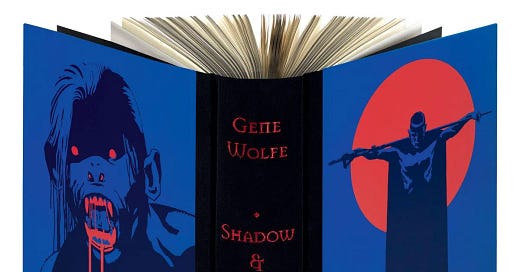Jonas and Severian remain trapped though it’s affecting Jonas in powerful and peculiar ways. Or perhaps not. Perhaps it’s Severian’s immunity to imprisonment that’s peculiar. And if we go down this line of thinking, is it so surprising?
He was raised in a gaol where people were held for days or weeks or months or years until they were ready to be tortured and/or executed. This confinement may, in a way, be almost a comfort to Severian, or at the very least familiar. And so he does not lose his head or get lost, the way Jonas and many of the others seem to.
He spends some time with a girl and I see almost a reflection there. Two people bound to imprisonment, raised in prisons, and the two of them able to see clearest. The whips, as she calls them, that emitted that strange violent light.
Then there’s Nicarete, another reflection of sorts. Another bound to prison, this one by choice.
The Claw is muted here, though Severian does use it to heal Jonas a bit, though it does nothing for his mind. And Jonas seems to be spiraling out of control, his thoughts whirring through time and place. And this is where we begin to learn about who and what Jonas is. For he is a man, but not like us. He mentions places familiar to us on our earth, like Lombardy. He speaks of knights and kings, of legends, but also of politics. As if he was there, impossible as it may be.
And though Jonas is spilling his life verbally before Severian, needing an audience, someone to tell, the more he speaks the more we are baffled. We the audience, I mean. Severian takes it in stride, perhaps familiar with the ramblings of the imprisoned.
Patient as a torturer.
The prison housing them is called the antechamber and, as we discover, is a bit of a makeshift prison. Severian finds it almost uncouth to group all the prisoners together in a big room rather than in individual cells, like in the oubliette, the Matachin Tower. Which is sort of funny, if you’re able to see and hear humor in the gallows.
But they’re able to move the ceiling panels to see the vast room housing their prison. This is another sign of descent, of collapse, of degeneracy in the Autarchy. This vast palace, the House Absolute, left often to disuse, where great structures with frescos and murals become boarded up, transformed into a place to keep prisoners for generations.
The senselessness of it. The timelessness of it. The Urth is old. The House Absolute itself is ancient. The sun dies. People live in mausoleums of civilizations not knowing even what signs signify.
And then there’s Jonas, our sweet Jonas, our friend Jonas.
“I have to talk to somebody, so it has to be you even though you’ll think I’m a monster when I’m done. You’re a monster too, do you know that, friend Severian? A monster because you take for your profession what most people only do as a hobby.”
“You’re patched with metal,” I said. “Not just your hand. I’ve known that for some time, friend monster Jonas. Now eat your bread and drink your coffee. I think it will be another eight watches or so before they feed us again.”
“We crashed. It had been so long, on Urth, that there was no port when we returned, no dock. Afterward my hand was gone, and my face. My shipmates repaired me as well as they could, but there were no parts anymore, only biological material.” With the steel hand I had always thought scarcely more than a hook, he picked up the hand of muscle and bone as a man might lift a bit of filth to cast away.
Is Jonas a man with a metal hand and other metal parts or is he a metal man with human parts?
I mean, I think the answer is clear but do you see how Wolfe doesn’t simply tell us? There is no definitive declaration. Rather, he walks us to the edge of knowing and leaves us there. And he does this and has done this countless times throughout these two books so far.
What do we know definitively about anything in the novel? I mean, there is a foundation, a knowledge pool to draw answers from. But so often, he leads us towards a path, slows to a standstill at its mouth, has us look down the winding dirt path between reaching trees, but rather then lead us down and through this path of knowing, he only gestures towards it before leading us to still another path.
Often, we get lost in the woods, but we will find the path again, or some path. For even Severian’s journey from the Matachin Tower to the House Absolute has not been straight. It hasn’t even been a crooked journey out, but a winding, weird, wyrd, wiling way.
Where does it end?
Well, we know he backs into his chair as Autarch, but how do we get from where we stand in the Antechamber with our halfmetal friend to those impossible heights?




I LOVE what Wolfe does here. I would guess most readers would assume that this is a human from space who has a metal hand. Then Wolfe slowly gives us more information until here where he flips it around and shows us our assumption is backwards. A metal man who is disgusted with his makeshift biological replacement parts.